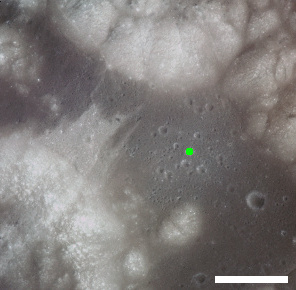 Location of Steno-Apollo crater in Taurus-Littrow Valley. South Massif is at lower left, North Massif is at top center, and Sculptured Hills are at upper right. Scale bar is 5 km | |
| Coordinates | 20°09′N30°47′E / 20.15°N 30.79°E |
|---|---|
| Diameter | 520 m [1] |
| Eponym | Astronaut-named feature |
Steno-Apollo is a feature on Earth's Moon, a crater in Taurus-Littrow valley. Astronauts Eugene Cernan and Harrison Schmitt visited it in 1972, on the Apollo 17 mission. The astronauts referred to it simply as Steno during the mission. The north rim of Steno is Geology Station 1 of the mission.
Contents
To the south of Steno is Emory, to the northwest are Trident and Powell, and to the northeast is Sherlock.
The crater was named by the astronauts after the Danish geologist Nicolas Steno. [2]


